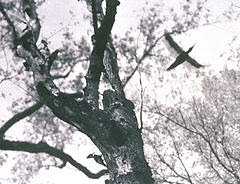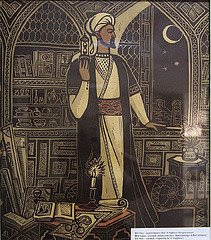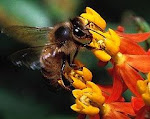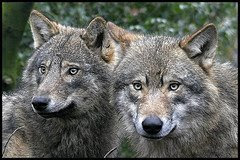Monday, April 27, 2009
Wednesday, March 11, 2009
Gerard Toulouse Responds to PHELMA students
Many worthy and stimulating questions have been raised by your students,and I will attempt to provide constructive answers in orderly fashion.
Let me today answer the first initial objection, which I rephrase (a bit brutally, I admit) as:
"Ethics is relevant for scientists, not for engineers."
I made a Google search for the following expressions:
- scientific ethics: 41,000 references
- engineering ethics: 158,000
- medical ethics: 3,390,00
- business ethics: 4,770,000
These observations (crude as they are) provide food for thought. The Wikipedia notice for "engineering ethics" contains many interesting contents. However the French version is appallingly poor. Should not some of Phelma's students consider working to improve it? Perhaps in connection with students of Ecole polytechnique de Lausanne. Long ago, EPL produced a "Serment d'Archimède", Archimedean Oath for Engineers.
More later,
with best wishes
Gérard Toulouse
(see Students Comments)
Wednesday, March 4, 2009
The Human Spirit, the Enchantment in the Forest at Galleons Lap, and the Tao
Instructions
- Read three extracts presented below from Margaret Somerville's books The Ethical Canary and The Ethical Imagination, and ONE of the two extracts from Benjamin Hoff's work, The Tao of Pooh.
- Then answer just ONE question.
- Write no more than 100 -150 words.
- Use a neutral style as studied in class (i.e. with Anglo-Saxon words and contractions).
- When you have finished submit it as a comment to this blog post.
- Margaret Somerville has kindly agreed to have a look at your ideas.
"Our contemporary search for ethics shows, I believe, that we are becoming much more sensitive than have been to [the] threats to our human spirit - the deeply intuitive sense of relatedness or connectedness to all life, especially other people, to the world, the universe and the cosmos in which we live; the intangible, invisible, immeasurable reality that we need to find meaning in life and make life worth living. In short, the human spirit is the metaphysical reality (that which is beyond the physical) that we need to fully live fully human lives." (Somerville, 2000, p.2)
"One manifestation of the human spirit or human spirituality is the longing for transcendence - the strong desire to experience the feeling of belonging to something larger than ourselves." (Somerville, 2009 p.8)
I believe our most authentic selves are to be found in the complex interactions of knowing ourselves, relating to others, appreciating our place in the great web of life, and seeing ourselves as part of the earth, the stars, the universe, and the cosmos. Some scientists tell us that we came from stardust - the earliest forms of life on earth might have arrived in meteorites that crashed; to rephrase the Ash Wednesday liturgy, "Remember man thou art stardust and into stardust thou shalt return." That fact, assuming that it will prove to be correct, and the idea that science can verify it, is astonishing and wondrous. The acute and continuous awareness of a mind-blowing web of relationships - that is what I call the human spirit. (Somerville, 2009 pp 56-57)
***
"They walked on thinking This and That, and by-and-by they came to an enchanted place on the very top of the Forest called Galleons Lap, which is sixty-something trees in a circle; and Christopher Robin knew that it was enchanted because nobody had ever been able to count whether it was sixty-three or sixty-four, not even when he tied a piece of string round each each tree after he had counted it. Being enchanted, its floor was not like the floor of the Forest, gorse and bracken and heather, but close-set grass...Sitting there they could see the whole world spread out until it reached the sky, and whatever there was all the world over was in them in Galleons Lap."
Extract by A.A.Milne cited in Hoff (1982, p.152)
"To Lao-tse (LAOdshuh), the harmony that naturally existed between heaven and earth from the very beginning could be found by anyone at any time, but not by following the rules of the Confuscianists. As he stated in his Tao Te Ching (DAO DEH JEENG), the "Tao Virtue Book," earth was in essence a reflection of heaven, run by the same laws - not by the laws of men. These laws affected not only the spinning of distant planets, but the activities of the birds in the forest and the fish in the sea. According to Lao-tse, the more we interfered with the natural balance produced and governed by natural laws, the further away the harmony retreated into the distance. The more forcing, the more trouble. Whether heavy or light, wet or dry, fast or slow, everything had its own nature already within it, which could not be violated without causing difficulties. When abstract and arbitrary rules were imposed from the outside, struggle was inevitable. Only then did life become sour.
To Lao-tse, the world was not a setter of traps but a teacher of valuable lessons. Its lessons, just as its laws needed to be followed; then all would go well. ...What he saw operating behind everything in heaven and earth he called Tao (DAO) "the Way". A basic principle of Lao-tse's teaching was that this Way of the Universe could not be adequately described in words, and that it would be insulting to both its unlimited power and to the intelligent human mind to do so. Still, its nature could be understood ..."
Extract from The Tao of Pooh by Benjamin Hoff
Questions
Answer EITHER question 1 OR question 2
1) What do the 'enchantment' in the forest described in Hoff (1989) and the the 'human spirit' defined in Somerville (2000) have in common?
2) Compare the Tao and the 'Human Spirit'. Do you think they are the same thing?
References
Hoff, B (1982) The Tao of Pooh. Egmount. London.
Somerville, M (2000) The Ethical Canary. Science, Society and the Human Spirit. McGill-Queen's University Press. Montreal
Somerville, M (2009) The Ethical Imagination. Journeys of the Human Spirit. McGill-Queen's University Press. Montreal
***
Student Responses:
For Margaret Somerville, in the Ethical Canary (2000), the human spirit is "the deeply intuitive sense of relatedness or connectedness to all life, especially other people, to the world, the universe and the cosmosin which we live". Even though the Tao explains that everything is related and in harmony due to the rules of nature, Lao tse cleary explains that being connected to other people is a mistake(unless no form of authority arises), because it leads to the loss of the path (Tao). Indeed, asking a question would be an insult to the laws of the universe, trying to explain them by words."The Way that can be described is not the true Way." (Tao Te Ching). At the same time, answering quesitons would imply reverting to the same level as the person that did ask, because Taoism states that everybody can achieve enlightenment, but needs to escape from the human world, that has put human rules to nature,therefore going further away from harmony and connectedness to the universe. Somerville's definition of the human spirit is more Confucianist than Taoist; indeed, in the Three Jewels of Tao, it is said that the way can only be found by a"refusal to assert active authority".
Sebastien
***
Dear Margaret,
I have read your writings about the Human Spirit, and also the ones of Lao-tse about the Dao. I would say that even if both texts deal with the idea of an intangible law which links all of us, they are not describing the same thing.
Lao-tse talks about it as if it was a divine rule that runs the entire world and out of which we should learn. Whereas, you see the Human Spirit as an achievement for human beings, finding the right way to lead our lives. I would say that according to you this law already exists for the human beings and it is our duty to respect it. However, in Lao-tse’s view: we should create our own way of life watching the world running around us.
Best regards
Richard
Sunday, March 1, 2009
Answers to Connections
Squirrel Wars
1.The news item concerns two species of squirrels, what are they?
The red and the grey squirrel.
2.Which one was introduced?
The grey squirrel.
3. What is the origin of the introduced squirrel?
North America.
4. What is the problem that the dominant species is causing?
The grey squirrel outcompetes the red squirrel for food and carries a virus that is passed on to the red squirrel.
5. What is the solution?
Catching and killing the grey squirrel.
6.What is the best way to catch a grey squirrel?
Use hazzel nuts as bait.
7. What is done with the carcasses?
They are butchered and the meat sold to the public.
8. Who is buying the meat and what class of people do you think it appeals to?
The meat is sold to "upmarket" or upper class butchers; the customers are probably rich people.
9. What is the RSPCA's (Royal Society for the Prevention of Cruelty to Animals) position on the culling of the grey squirrel?
The destructive management of the grey squirrel is a problem because it is now part of the modern English countryside and it would be extremely difficult to eliminate it. attempts to do so would likely fail and only result in undue suffering.
The Life of Brian
1. In the context "...you're putting us off ..." means: d) you're making us lose our train of thought
2. Why are you always on about women Stan? "...always on about women..." could be replaced by: d) always talking about woman.
3. What point is being made about gay/lesbian marriages and their fight for the right to have children.
That it is all rather silly because it is physically impossible to have children.
4. Do you think the point made by the sketch agrees or disagrees with Margaret Somerville on gay/lesbian marriages? Support your opinion.
Somerville opposes same sex marriages because implicit in the idea of marriage is the right to found a family; that is, to have children. She believes the idea of two women or two men having their own genetic children compromises the "human spirit". Loosely put, she defines the latter as the sense of connectedness to others and to nature. She is worried that the children from same sex marriages would be not quite human, and we do not have the right to put these children into a society where they may be physically or psychological at risk.
5.Where does the humour lie in this sketch?
According to Henri Bergson's essay Le Rire one of the reasons we laugh is to ridicule maladaptive or abnormal behaviour. By abnormal we could say 'unnatural' and Stan's desires to have babies is unnatural simply because he is a man. In Mikhail Bakhtin's study of the carnaval, he argues that laughter occurs when we shift from a highly stressed moral or idealistic state of mind to a carnal one. Stan's desire is purely theoretical, and it is Reg's attempts to bring him down to earth or down to reality that makes us laugh.
6.There is a common ethical theme in both listening exercises. Work with your partner and try to find it.
Common Themes
The strongest thematic connections between the two videos is the debate around the preservation of what is considered natural and the futility of struggling against an insurmountable reality.
- In 'Squirrel Wars' the red squirrel respresents the natural English countryside, the grey squirrel represents what is invasive and unnatural.
- The attempt to eliminate the grey squirrel is controversial. According to the RSPCA it is extremely difficult, if not impossible to achieve, and a culling programme may only lead to unnecessary suffering. The reason being that the grey squirrel has become part of the modern English countryside which is simply too late to ever completely restore.
- In the scene from The Life of Brian, Stan desires to have babies. It is of course is impossible for him ever to realise his dream, so why should he desire it? The scene ridicules the aspect of the human condition of yearning for things that we can never possess or achieve; and what's more, fighting for the right to do this.
- The other theme, which is implicit in the idea of unrequited and unrealistic desires, is that these wants are foolish because they are going against what is natural; that is, it is silly for Stan to want to have babies because he doesn't have a womb. It is better to live within one's limitations.
- On the other hand, if students have already studied the the radio interview with Margaret Somerville (see: Is it Right -Introducing Margaret Somerville )they will know that in 7-10 years it will be possible for same sex couples to have their own genetic children. This throws a shadow over the humour in the sketch; maybe Stan's desire to have babies is not so absurd afterall?
Saturday, February 28, 2009
Social Responsibility of Scientists - Initial Student Reactions
After listening to their classmates' analyses, they were asked whether they agreed or disagreed with Prof. Toulouse. In general, a third of each class agreed with the ideas in the extracts. Here is a summary of the three principal opposing points of view:
1) We are engineers not researchers, so the responsibility described by Toulouse does not apply to us. There is pure science and applied science, and engineering is applied science. Even though we use the scientific method we do not consider it "science". Science, for us, is uniquely research.
2) It is impossible to know what is right or wrong, good or bad, as everyone values differently. Therefore, it is impossible to judge whether what we are doing in science is ethically good or bad.
3) It is impossible to predict how the results of research could be misused. In fact, all inventions can be used for good or evil. If we yielded to the fear of grave misuse, there would be no research done at all. Students cited the public suspicion of nanotechnology in Grenoble. They contrasted the benefits such as finding a cure for blindness as a opposed to public misconceptions, such as the development of nanochips for government spying on citizens.
In the next lesson, this Thursday, students will elaborate and defend their points of view in the form of comments to this post. Gerard Toulouse will be kindly invited to view the comments and contribute.
Student Responses:
Anonymous said:
Toulouse (2006) quite exaggerates when he says: "Scientists have a duty of alert, because they are best placed to alert society to the possibly harmful consequences of their activities, discoveries and inventions[..]this continuing responsibility implies a duty of discernment and vigilance, sustained on the long term." I find that it is just too easy to always refer to misuse of new technology when talking about research.
For the most part, researchers are not looking for the answer to a question, but they are looking for the question itself. They try to discover new phenomenon, that means they sometimes have no idea of what they are going to discover.
However, I don't completely reject this idea of responsibility. Not every scientist should be responsible for his discovery, but it is the scientific community.
I am convinced that average citizen doesn't have the right amount of education /culture to understand and accept new technologies. They fear novelty and their first reaction is rejection, which inhibits possible applications of a scientific discovery.
I believe that scientists are responsible to their community. This is why they regularly meet to present the progress of their research. A closer collaboration may be salutary for preventing misuse of inventions, like by sharing their ideas in scientific newspapers, in a short way by communicating.
Laureline & Maxime said:
Every day in the national newspapers, national companies are involved in trials for having behaved in their own interest without taking into account the possible consequences for the whole society. We disagree with the first point.
Indeed, obeying blindly orders in a company may be very dangerous. Let us take the example of Monsanto in Argentina. Ten years ago, the firm developed a new GMO corn plant which was designed to resist to a very powerful weedkiller "Roundup" also produced by the same company. This seemed firstly to be a good point for the local farmers, because it helped to develop the economy, but in reality they were totally dependent on Monsanto. Furthermore, the consequences for the local ecosystems were disastrous.
We think that each engineer at Monsanto may be responsible and could have said "NO!" Nevertheless, we agree with the third point. Every theoretical discovery may be turned into a good or a bad technology. A well-known example is the use of the nuclear energy at the beginning of the 20th century. When Einstein wrote the equations, he did not think that it would be used in the atomic bomb. After the Hiroshima and Nagaski events, he wrote with Russel the Manifesto, in which they denounced the use of the nuclear energy in such an intention.
Coline said:
I agree with Prof.Toulouse about a duty of whistle blowing. It would be irresponsible to say nothing about a potential danger of a discovery.
However, I have some reservations. Firstly, I believe that there are morals and values inherent to science. Researchers are impassioned by their work, and they see science as an hope for mankind. We perfectly know that in France for example, salary is not the motivation for public researchers, since they are poorly paid.
Secondly, I would like to point out that whistle blowing can create fear, lead to moratoria and stop every research activity in a certain field; it is the case for steam-cell and GMOs. The public is only informed by the media, and therefore the message that they get is truncated by excessive simplifications and the temptation to create controversy. That is why we can understand the reluctance of scientists to give information about potential dangers. If we consider the example of GMOs, the FAO lists a lot of benefits that we could get from them, such as using less land for agriculture, or reducing the use of pests, which are health-threatenning and so on.
Considering all these facts, what about a duty of whistle blowing, but only within the scientific community? Maybe the decisions about science should be taken by commissions of scientists; that is to say, between people who can put the potential dangers into their context. Of course, I am not implying that the public should not get any information, which would be disinformation, and in a way a kind of totalitarism.
Damien, Clément and Ludovic said:
First of all, we totally disagree with the first argument. This is because engineers are the ones who decide if they will apply science in a good or in the bad way not researchers. Besides, engineers are directly involved in the design of a product for its commercialization.
One example of the influence of science on the future of the planet is biofuels. Once presented as the solution to global warming, they are now known to be deleterious. In Borneo for instance, the Indonesian government wants to destroy a part of the rainforest covering 10,000 square kilometers to grow palm oil (http://www.planete-urgence.com/).
How did that happen ? When it was presented to decision makers, probably the advantages were exaggerated and the drawbacks were not sufficiently explained. Proof of this can be found in a scientific article explaining that biofuels are good for the future of the planet (see Hourcade, 2008). As a result, biofuels were chosen by countries such as Brazil as a new major part of their economy.
For us the responsibility of scientists is to be able to explain clearly and entirely the consequences of an action to decision makers, without being blinded by the search for financial support.
References:
Jean Charles Hourcade, 2008 : “Biofuels and the Environment-Development Gordian Knot: Insight on the Brazilian Exception” http://www.centre-cired.fr/spip.php?article684
Alexandre & Matthias said:
Comment on no. 2)
It is surely a fact, and we support it, that knowing what is good and what is bad, what is right and what is wrong, is the basis for an ethical judgement. Although there certainly exist different values (or different priorities of values) that may lead to different judgements of individuals (depending on social and religous background etc), big efforts towards finding a common understanding have been undertaken since first societies were formed.
In the context of globalization, more and more approaches to agree upon a universal code have been and are made, such as - in a wider understanding - The Charter of Human Rights (UN 1948). Furthermore, more or less binding and specific codes are nowadays already implemented in different companies, laboratories, associations or even countries. For exemple, in the French CNRS, the COMETS (the ethics committee) oversee every scientific project to ensure its accord with a previously agreed, internal charter of ethics. On a larger scale, a universal code of ethics for sciences has been proposed by Professor Sir David King who stated that: "...if every scientist followed [it], we would improve the quality of science." (BBC News).
Stéphanie and Antoine said:
We have read all the principal points of view and we want to discuss some of them.
We do not totally agree with the first one “We are engineers not researchers, so the responsibility described by Toulouse does not apply to us”.
In fact, we think that researchers are responsible only for the direct effects of new discoveries. Moreover, according to us, they have the power and the duty to warn society against the harmful dangers of products but they can't prevent people using them.
On the contrary, firms and engineers are responsible for the use of products and have to decide whether a product is good or evil. Thus, ethics is a crucial point for firms. For example, when a new material is discovered, researchers have to know and warn of the real impacts of it, whereas firms and engineers have to judge whether the use is ethical or not . Therefore, there is a double responsibility in sciences: on the one hand researchers and on the other hand both firms and engineers.
Our point of view is commonplace in most fields of science but in some cases such as medicine, ethics has a more important role in experiments.
Intrinsic Value
Aims
Reading a text out loud: sentence stress, intonation and eye contact; the second conditional - If I were you, I would be...; empathy for animals and plants; understanding the debate surrounding the intrinsic value of all life forms.
Introduction
In the previous section we looked at the notion of the instrumental value of nature as an argument to protect biodiversity. In this section we look at 'intrinsic value': that all of nature has worth irrespective of how useful it is to people (ten Have, 2006).
According to Meffe(2003) the word 'value' is related to the noun form of the word 'good'. Good is the same as 'interest'. Now, the interests/goods/values of an organism are the things it requires to attain its goals. The basic goals of any animal or plant is survival and reproduction. So the interests/goods/values of a gold crest (Europe's smallest bird) are to live in conifer forests, because this is where it finds its food and its nest sites. So, to say the gold crest has intrinsic value is to say that it has its own interests.
Referring to the Nobel prize winning physicist Ernst Shrodinger, Rolston (2006) argues that all organisms practise a kind of conservation biology; that is, they protect and conserve their own life. This is their prime concern, and it has been going on since life emerged over 3.5 billion years ago! He asserts that implicit in the idea of life is the notion of continuation or survival. In other words all living things have one thing in common, they all value being alive over being dead.
Understanding that all living things have this interest in common helps us identify with them; this leads to a mutual respect. I remember Brian Edwards, the former host of the New Zealand Saturday morning radio show 'Top of the Morning' reporting a listener's views on the the brutal culling of the brush tailed possum. Damaging as they were to the New Zealand native forest they were still in the end, not unlike us, "...just trying to survive."
The feeling that we should respect possums not only comes from our ability to empathise with them, but also our imaginations. We are capable of projecting ourselves into the skin of animals, and imagining what it must be like to be them. The following extracts do just that.
Listening
Go to Harper Audio. Find Part 1. Listen to J.R.R.Tolkien reading selections from The Two Towers, the second book in the Lord of the Rings trilogy. Here the two hobbits, Pippen and Merry are being questioned by the ent Treebeard (see Figure 1 at the top of this post). Move the slider bar to minute 3:07 and listen to minute 4:05. While you listen identify which words Tolkien stresses. The text is provided below:
'An Ent? said Merry. 'What's that? But what do you call yourself? What's your real name? 'Hoo now!' replied Treebeard. Hoo! Now that would be telling! Not so hasty. And I am doing the asking. you are in my country. What are you, I wonder? I cannot place you. You do not seem to come in the old lists that I learned when I was young. That was a long, long time ago and they may have made new lists. Let me see! Let me see! How did it go?
Learn now the lore of Living Creatures!
First name the four, the free peoples:
Eldest of all, the elf-children;
Dwarf the delver, dark are his houses;
Ent the earthborn, old as mountains
Man the mortal, master of horses:
Learn now the lore of Living Creatures!
From The Two Towers by J.R.R.Tolkien p.453
Answers
Reading a text out loud - Sentence stress
Stress in English falls on the key words in the sentence. These words are called content words, and carry most of the meaning. If you were only to say these words the listener would be able to grasp the general meaning. The other words are not stressed, they are called structure ( also called function words), and they make the sentence grammatically correct. If you eliminated these words you could still understand the sentence (Beare, 2009). Here is a list of the types of content and structure words adapted from Beare (2009).
Content words:
Nouns, verbs, adjectives and adverbs. Please note, that we do not systematically stress each one of these types of words but principally those which convey the most meaning.
Structure words:
Determiners (a, the, this, that, some, any, a few etc.), auxiliary verbs (do, does, can, have, etc.), prepositions (after, before, in, on, above, etc.), conjunctions (because, as, while, and, etc.) and pronouns (he, her, they, etc.).
Eye contact with the listeners is made to enhance understanding or put emphasis on certain words or phrases that speak about extraordinary or particularly interesting information.
Timing and Rhythm
English is known as a 'stressed timed language'. That means that the time between stressed words is kept more or less the same. This creates a rhythm of:
stressed-unstressed-stressed-unstressed, stressed etc: / - / - /
Consider the following lines from E.E.Cummings' poem, 'somewhere i have never traveled'. The words in bold are verbs, nouns, adjectives and adverbs. When they are removed from the text, notice that the essential meaning is still preserved.
or if your wish be to close me, i and my life will shut very beautifully, suddenly,as when the heart of this flower imagines the snow carefully everywhere descending;
wish be close
life shut beautifully
suddenly
heart flower imagines
snow carefully descending
The poem was featured in Woody Allen's movie Hannah and Her Sisters. You can go to Youtube and watch the clip. At the conclusion of the character Lee reads stanzas 3 and 5: http://www.youtube.com/watch?v=-TSf8hsJTps
You will find that if you place stress in the correct places, and use correct eye contact while reading you will quite simply be better understood and appreciated by native speakers.
Reading Seminar
In small groups of 2 or 3 read one of the extracts and answer the questions together. Then split up and form a group with two other students who have read different extracts. In your groups exchange the information.
Now, each person in the group should have a speaking role. Divide the text you have been given into parts, and assign a part to a student. Identify the sentence stress, practise reading your passage out loud with your partner. Present your extract to the rest of the class in the following way:
Introduction: Explain briefly what your text is about. You could simply paraphrase the introduction to each extract if you like.
Vocabulary: Put on the board the vocabulary list and any other new words you have encounterd and give definitions.
Reading: Each student in the group should read part of the extract to the class using the speaking techniques above. The key words are coloured in blue.
Analysis: Answer the questions relating to your extract for the class
Extract 1
Siddhartha is the story of the son of a Brahmin. He leaves his home to seek enlightenment by himself, though accompanied by his loyal friend Govinda. The scene, you are about to read, finds him with a group of wandering ascetics called the Samanas. They practise extreme poverty and the mortification of the flesh as techniques to attain nirvana.
Instructed by the eldest of the Samanas, Siddhartha practiced the eradication of ego, practiced samadhi according to new Samana rules. A heron flew over the bamboo forest - and Siddhartha received the heron into his soul, flew over forests and mountains, was a heron, ate fish, felt the pangs of heron hunger, spoke in heron squawks, died a heron death. A dead jackal lay on the sandy bank - and Siddhartha's soul slipped into the corpse, was dead jackal, lay on the beach, grew bloated, stank, decayed, was torn apart by hyenas and flayed by vultures, became a skeleton, became dust, blew into the fields. And Siddhartha's soul returned -it had died, had decayed, become dust, it has tasted the bleak euphoria of the cyclical journey, and then, freshly thirsty, it waited, crouching like a hunter for the gap in the cycle where escape was possible, where the end of causality began, an eternity free of sorrow. He killed off his senses, he slipped from his Self to enter a thousand new shapes - was an animal, was cadaver, was stone, was wood, was water - and each time he awakened he found himself once more. The sun would be shining , or else the moon , and he was once more a Self oscillating in the cycle; he felt thirst, overcame the thirst, felt new thirst .
Siddhartha by Herman Hesse p.14 . Translation by Susan Bernofsky
Extract 2
They made noises and at first he was frightened at them. Then moved. He placed his paw on one, and its movements were accelerated. This was a source of enjoyment to him. He smelled it. He picked it up in his mouth. It struggled and tickled his tongue. At the same time he was made aware of the sensation of hunger. There was a crunching of fragile bones, and warm blood ran in his mouth. The taste of it was good. This was meat, the same as his mother gave him, only it was alive between his teeth and therefore better. So he ate the ptarmigan. Nor did he stop till he had devoured the whole brood. Then he licked his chops in quite the same way his mother did, and began to crawl out of the bush.
White Fang by Jack London p.72
The following extracts come from part two of the trilogy The Lord of the Rings, called The Two Towers by J.R.R. Tolkien. Here the two hobbits (hobbits are small human like creatures) have been sent to the forests to encourage the ents (ents are tree like creatures, see Tom Loback's illustration above) to join a fight against the forces of Saruman. Read the following passages which include a description of the ent Treebeard, and the elves attempts to communicate with the trees and ent drink.
They found that they were looking at a most extraordinary face. It belonged to a Man-like, almost Troll-like, figure, at least fourteen foot high, very sturdy, with a tall head, and hardly any neck. Whether it was clad in stuff like green and grey bark, whether that it was its hide, was difficult to say...The lower part of the long face was convered with a sweeping grey beard, bushy, almost twiggy at the roots, thin and mossy at the ends. But at that moment the hobbits noted little but the eyes. These deep eyes were now surveying them, slow and solemn, but very penetrating. They were brown, shot with green light. Often afterwards Pippin tried to describe his first impression. 'One felt as if there was an enormous well behind them, filled up with ages of memory and, long, slow, steady thinking; but their surface was sparkling with the present; like the sun shimmering on the outer leaves of a vast tree, or on ripples of a very deep lake.' (p.452)
Some of my kin look just like trees now, and need something great to rouse them; and they speak only in whispers. But some of my trees are limb-lithe, and many can talk to me. Elves began it, of course, waking trees up and teaching them to speak and learning their tree-talk. They always wished to talk to everything, the old Elves did. (p.457)
The drink was like water, indeed very like the taste of the draughts they had drunk from entwash near the borders of the forest, and yet there was some scent or savour in it which they could not describe: it was faint, but it reminded them of the smell of a distant wood borne from afar by a cool breeze at night. The effect of the draught began at the toes, and rose steadily through every limb, bringing refreshment and vigour as it coursed upwards, right to the tips of the hair. Indeed the hobbits felt that the hair on their heads was actually standing up, waving and curling and growing. (p.460)
From J.R.R.Tolkien - The Two Towers - Book II of The Lord of the Rings
*
*
Vocabulary *
1) Retell in your own words (i.e. paraphrase) the young wolf's first experience of eating live food.
2) Environmental philosopher Holmes Rolston III says all animals have interest (concerns or goods). What interests of both the ptarmigan and wolf are expressed in this extract?
3) Explain the writer's choice of the word 'chops' in the last paragraph.
sturdy, hardly, clad, bark, hides, weeping, bushy, twiggy, mossy, well, shimmering, ripples, to rouse, kin, limb-lithe, draughts, scent, faint, borne
*
Images courtesy of Flickr
TREEBEARD - illustration by Tom Loback by Tom Loback
Links to related Nature Art & Language lessons:
Empathy and the Girl with Pearl Earring
Monday, February 23, 2009
The Passenger Pigeon
Extract 9
"Not a pigeon had arrived at sundown. Suddenly a general cry arose—’ Here they come!’ The noise they made, though still distant, reminded me of a hard gale at sea passing through the rigging of a close-reefed ship. Thousands were soon knocked down by the pole-men. The birds continued to pour in. The fires were lighted and a magnificent as well as terrifying sight presented itself. The pigeons pouring in alighted everywhere, one above another, until solid masses were formed on the branches all around. Here and there the perches gave way with a crash, and falling destroyed hundreds beneath, forcing down the dense groups with which every stick was loaded; a scene of uproar and conflict. I found it useless to speak or even to shout to those persons nearest me. Even the reports of the guns were seldom heard, and I was made aware of the firing only by seeing the shooters reloading.
Words. Reading time:
Question:
See 'Falling Bough' byWalton Ford








+II+-+socialist+art+by+night+_eulen.jpg)








